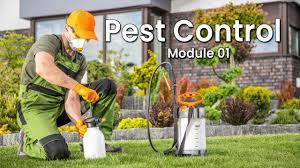Pest control is a crucial skill in today's world. Whether you're dealing with household pests or looking to start a professional pest control business, the ability to manage infestations efficiently is essential. Learning pest control online offers convenience, flexibility, and accessibility, making it a popular choice for many individuals.
The rise of online education has brought various courses to our fingertips. From basic household pest management to advanced techniques for commercial properties, there is a wide range of options available. Let’s explore the benefits, structure, and key components of online pest control courses.
Benefits of Online Pest Control Courses
Online pest control courses have gained traction due to their flexibility and accessibility. Here are some compelling reasons why individuals prefer online learning:
-
Flexibility: Online courses allow learners to study at their own pace. This flexibility is particularly beneficial for those who have jobs, families, or other commitments.
-
Accessibility: You can access high-quality education regardless of your location. All you need is a reliable internet connection.
-
Cost-Effective: Many online courses are more affordable than traditional classroom-based training. Additionally, you save on travel and accommodation costs.
-
Expert Guidance: Reputable online courses are often designed and taught by industry experts. This ensures that you receive up-to-date and practical knowledge.
-
Certification: Many courses offer certifications upon completion, which can boost your credibility if you plan to pursue a professional career in pest control.
Understanding the Structure of Online Pest Control Courses
Online pest control courses are designed to cater to a wide range of learners, from beginners to professionals. Here’s what you can typically expect:
1. Introduction to Pest Control
This module provides an overview of pest control, including its importance, history, and applications. Topics covered might include:
-
The definition of pest control
-
Common types of pests
-
The impact of pests on health and property
2. Types of Pests
A detailed analysis of various pests, such as:
-
Insects (ants, cockroaches, mosquitoes)
-
Rodents (rats, mice)
-
Termites
-
Bed bugs
3. Integrated Pest Management (IPM)
Integrated Pest Management is a sustainable approach to pest control that combines different methods for maximum efficiency. This section often covers:
-
Principles of IPM
-
Biological control methods
-
Mechanical and physical control techniques
-
Chemical control methods
4. Safety Measures
Safety is paramount in pest control. This module focuses on:
-
Handling chemicals safely
-
Personal protective equipment (PPE)
-
Environmental safety measures
5. Tools and Equipment
You will learn about the tools and equipment used in pest control, such as:
-
Sprayers
-
Foggers
-
Bait stations
-
Traps
6. Practical Applications
Some courses offer virtual demonstrations or simulations to give you practical insights. Topics might include:
-
Inspecting properties for signs of pests
-
Implementing treatment plans
-
Monitoring and follow-up
Choosing the Right Online Pest Control Course
With so many options available, selecting the right course can be daunting. Here are some factors to consider:
-
Accreditation: Ensure the course is accredited by a reputable organization.
-
Curriculum: Look for a comprehensive curriculum that covers both theory and practice.
-
Certification: Check if the course provides a certificate upon completion.
-
Instructor Expertise: Research the qualifications and experience of the instructors.
-
Student Reviews: Read reviews and testimonials from previous learners.
Career Opportunities in Pest Control
Completing an online pest control course can open up various career opportunities, such as:
-
Pest Control Technician: Perform inspections and treatments to eliminate pests.
-
Pest Management Consultant: Advise clients on pest prevention and control strategies.
-
Business Owner: Start your own pest control business.
-
Specialized Roles: Focus on specific areas, such as termite control or bed bug extermination.
Practical Tips for Online Learners
To make the most of your online learning experience, consider these tips:
-
Set a Schedule: Allocate specific times for studying to stay consistent.
-
Create a Dedicated Space: Choose a quiet, distraction-free environment for learning.
-
Engage with Instructors and Peers: Participate in forums and discussions to enhance your understanding.
-
Practice What You Learn: Apply the concepts in real-life scenarios whenever possible.
-
Stay Motivated: Keep your end goal in mind and celebrate small milestones.
The Importance of Certification
A certification can significantly enhance your credibility and career prospects. It serves as proof of your knowledge and skills, making you stand out to employers and clients. Many online courses include certification exams, so ensure you prepare thoroughly.
Why Pest Control Skills Are in Demand
Pest control is a growing industry due to:
-
Urbanization: Increased urbanization has led to a rise in pest problems.
-
Health Concerns: Pests can spread diseases, making their control a public health priority.
-
Economic Impact: Pest infestations can cause significant damage to property and crops.
-
Environmental Awareness: Sustainable pest control methods are becoming increasingly popular.
Final Thoughts
Learning pest control online is a smart choice for those looking to gain valuable skills in a convenient and flexible manner. Whether you’re a homeowner wanting to manage pests effectively or an aspiring professional aiming to build a career in the industry, online courses provide a wealth of knowledge and resources. Pest control courses online is an excellent search term to explore your options and take the first step toward mastering this essential skill.
Embrace the opportunity to learn at your own pace and become proficient in pest control techniques. With the right course, dedication, and practice, you can achieve your goals and make a positive impact in this vital field.



